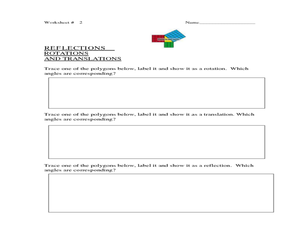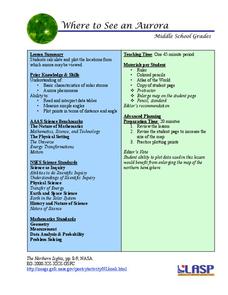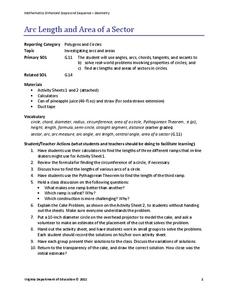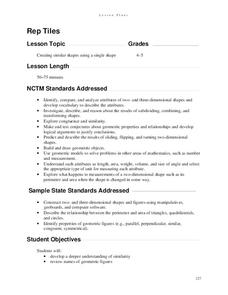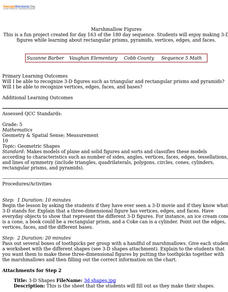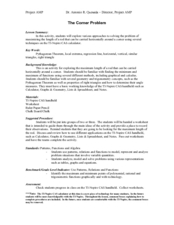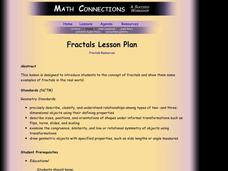Curated OER
Can You Name That Shape?
Learners use materials to build, investigate, and draw two-dimensional shapes (polygons). They combine the shapes they have built and draw from the pile to begin a round-robin activity to name and determine the attributes of a selection...
Curated OER
Point Comparisons
Young geometers investigate two-dimensional figures using coordinate grids. They identify polygons and draw examples of their reflection, rotation, and translation on a coordinate grid. And they complete a worksheet practicing examples...
PHET
Where to See an Aurora
Where can you see an aurora in North America? After completing an astronomy activity, scholars can locate the exact coordinates. Pupils plot points of the inner and outer ring of the auroral oval and answer questions based on...
PHET
CME Plotting
Young scientists build on their previous knowledge and apply it to coronal mass ejections. By plotting the path of two different coronal mass ejections, they develop an understanding of why most don't collide with Earth.
Virginia Department of Education
Arc Length and Area of a Sector
What do skateboarding and baked goods have in common with math? You can use them to connect half-pipe ramps and cakes to arcs and sectors. Pupils compare the lengths of three different ramp options of a skate park. They calculate the...
Improving Measurement and Geometry in Elementary Schools
Rep Tiles
In addition to the catchy title, this lesson plan provides upper graders an opportunity to more closely scrutinize the attributes of plane figures. In particular, they focus on the similarity of different shapes. Both whole-class and...
Curated OER
Marshmallow Figures
Students enjoy making 3-D figures while learning about rectangular prisms, pyramids, vertices, edges, and faces. After a lecture/demo, students use marshmallows, toothpicks and a worksheet imbedded in this lesson to create 3 dimensional...
Ohio Department of Education
Describing and Creating Plane Figures - Grade One
Young mathematicians draw, create, and describe different shapes using triangles. They discuss attributes of the original and created shapes. Pupils classify the created shapes and draw and write in mathematics journals to communicate...
Pyro Innovations
Get into Shape
Shapes are so fun! Little ones explore, identify, and create shapes using tangrams or pattern blocks. The activity is intended to stimulate critical thinking while engaging learners through play and shape identification. Each child will...
Curated OER
Investigating the Idea of Tan
Fifth graders use tan to solve problems involving right-angled triangles. They solve equations of the form tan(8) =a, for a between 180 degrees and 360 degrees. They state the value of tan (8) in special cases.
Curated OER
Similar Triangles
Ninth graders find the height of every day objects using techniques learned through postulates that allow triangles in a problem to be similar. They calculate the length of a missing side and solve proportions.
Curated OER
Equilateral Triangles
Students examine the attribute of equilateral triangles. In this equilateral triangle lesson, students examine a number of paper triangles to determine how they are classified. They determine how triangles are depicted in Navajo rugs.
Curated OER
Making Shapes
Tenth graders construct geometric figures using compasses and protractors.
Curated OER
Pythagorean Theorem
Students explore how the Pythagorean Theorem works and how to apply it.
Curated OER
Pythagorean Theorem
Students are introduced to the Pythagorean theorem. They use three different activities that give students the opportuntiy to observe triangles, and use the Pythagorean theorem and practice different ways of determining areas of...
Curated OER
Perimeter
Students examine the concept of perimeter. Students calculate the perimeter of a random shape on a grid. Students develop a better understanding of the concept of perimeter. Students calculate the perimeter of shapes.
Curated OER
An Introduction to Quadrilaterals
Students explore different types of quadrilaterals. Students define the terminology used with quadrilaterals. They create particular quadrilaterals based on specific characteristics of the quadrilaterals using an online tool.
Curated OER
The Corner Problem
Students explore the concept of the corner problem. In this corner problem lesson, students use the TI-NSpire to determine the maximum length a rod can be and still pass horizontally around a corner. Students use similar triangles to...
Curated OER
Figure It Out - Polygons
Sixth graders explore different polygons. In this polygon lesson, 6th graders examine a rhombus, quadrilateral, parallelogram, and rectangles. Students compare and contrast polygons and research shapes on the Internet.
Curated OER
Fractals
Students explore the concept of fractals. In this fractal lesson, students use applets to explore Koch's Snowflake, Sierpinski's Triangle, and other fractals. Students develop these concepts through exploration and teacher guided...
Curated OER
Introduction to Fractals: Infinity, Self-Similarity and Recursion
High schoolers think about several of the concepts from fractals, including recursion and self similarity. They use mathematical concepts of line segments, perimeter, area and infinity are used, and skill at pattern recognition is...
Curated OER
Altitude Tracking
Students estimate the altitude of a rocket during several flights. They create their own altitude tracking devise. They examine and discuss their results at the end of the activity.
Curated OER
Connecting Formulas Related to Geometric Figures
Students identify diagrams of quadrilaterals and circles by different names and classify the figures. They name the areas for each diagram and practice solving the formulas for each.
Curated OER
Exploring the Definition of Reflection
Learners practice using a protractor and ruler to draw various points and lines. Using a computer, they draw the points and lines in the program and describe the differences between their drawing and the computer's drawing. They complete...

